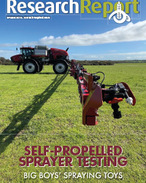This article is 8 years old. Images might not display.
The establishment of a $4 billion Regional Investment Corporation (RIC) will administer $2 billion in farm business concessional loans from 2018–19, as well as another $2billion from the National Water Infrastructure Loan Facility.
Legislation will be enacted this year to establish the RIC as a separate entity within the Agriculture portfolio and be governed by an independent board and CEO with commercial experience to appropriately manage public money.
The Department of Agriculture will be engaging with industry to discuss the new loan settings prior to the RIC opening its doors in 2018.
The National Landcare Program will receive $1 billion over five years with Federal Agriculture Minister Barnaby Joyce outlining a new National Landcare Program.
“The program will give certainty of funding to the thousands of volunteers, many of whom are farmers, who work to make sure that future generations will inherit healthy and productive land and water resources,” Joyce said.
The National Farmers Federation (NFF) said to stay tuned on the funding, as the next 12 months will see important decisions made about sustainable agriculture spending.
The Turnbull Government will also invest $8.3million over four years as an assurance system that will ensure the industry will develop effectively and efficiently meet Australia’s stringent animal welfare regulatory requirements.
The NFF, in its annual scorecard of the Federal Budget, gave it an overall B+ with a 12 month extension on farm businesses being able to write off $20,000 in expenditure and the investment in rail impressing the farmer advocacy group.
“While we hoped for an extension greater than 12 months, we’re pleased to see that the hundreds of people who contacted the Treasurer as part of our campaign weren’t ignored,” NFF president Fiona Simson said.
“The Budget announced that accelerated depreciation provisions for capital expenditure less than $20,000 would be extended for another 12 months. It will also apply to businesses with a turnover of less than $10 million – up from the previous $2 million,” she said.
The Australian farming body called the government’s expenditure of rail “a big deal” that has been a long time coming.
“When the line is completed in 2024-25, it will shave 10 hours off the existing Melbourne to Brisbane rail time – making it competitive with road transport, meaning fewer trucks,” the NFF said.
The NFF said it was a great outcome for farmers as the rail project should reduce the cost of getting key farm commodities to export markets.
However the group warned the project could quickly go south if a responsible approach isn’t taken regarding community consultation.
“New stretches of track will require land acquisition and we’ve told the Government firmly that they need to learn from the mistakes of the coal seam gas industry and have an open conversation with those affected,” it said.
Besides Inland Rail, funding has also been announced for Murray Basin Rail, regional Victorian rail upgrades, and business cases to assess new rail connections between major cities and regional centres























